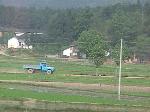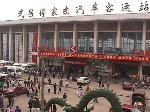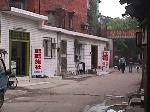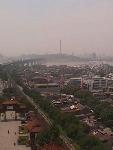- Getting around Lijiang. Dont stay in the Old Towns more than 2 days, there is nothing to do. KRISS Oct 9, 2013 05:46
- 2013 Beijing Temple Fair BENNYLAU Feb 26, 2013 03:29
- Malaysian traveling from KUL - LAX vis Shanghai PVG ZATI_DY Jan 3, 2013 20:15
The River - Part Four – Not Quite Wuhan
- Views: 3882
- |Vote: 0 0
- |Add to Favorites
- |Recommend to Friends
Ruminations on Hubei
It had been a mistake to leave the Yangtze River and continue on to Wuhan over land. Fortunately, my traveling companion Lao Hei and I found that there was a lot more of rural China to see on the journey that we might have missed had we stayed on the boat.
Crowded and bumpy, our bus entered the broad stretch of countryside that lies between Yichang and Wuhan, part of the great expanse of farmlands that, one would assume, makes up the majority of Hubei province. Lao Hei and I were propped up in the back seat, surrounded by our own luggage and the baggage thrust into the back by fellow passengers. The view from the window was clear, the afternoon bright in spring sunshine, the crops on the fertile soil intensely green. We didn't speak, I took out some music and began to play, some quiet Chinese popular music, Andy Lau and Wang Fei.
Perhaps it was this soundtrack that seemed to put the whole setting in context. The songs I chose to listen to were perhaps too simple, easy tunes with a hint of traditional China, the odd melancholy phrase stretched out from a two-string violin. Many of the lyrics I was beginning to understand for the first time, they had that ring of classical Chinese preciseness that is impossible to relate in English. For me, whenever I read or hear a good sentence that is uniquely Chinese, I have a brief vision of the age of the language and of innumerable lifetimes spent toiling Chinese soil, incubating the world's most precious and profound cultural achievement in stone huts and remote villages. I grew up speaking a language that is greedy in its art, in that the history of English is one of a tongue that has pilfered thousands of words from other countries, until it has become the one language with more words than any other. English poetry works by selecting the most refreshingly accurate word from a mass of close alternatives. Chinese is far more neatly interwoven, its words call on each other for meaning rather than string together in clumps like they do in English. There is something essentially human about Chinese that appeals to me immensely, and on the back of the bus headed for Wuhan, I was suddenly reminded of that, and of why I was in the country in the first place.
The countryside of Hubei was lush and smartly decorated with bright, white farm houses on lime-green fields. China is unpolluted outside the cities, and therefore the image that many people have of China as being a decayed and dirty place are exaggerating the normal developmental problems of crowded cities. The countryside, 95% of China's surface, is old and pure, remote and clean. Occasionally I saw families outside, carrying out existences in inaccessible places, little different from the families living on the same land a thousand years before them; the dirt right under the fingernails, the shirts scrubbed in river water with soft rocks, the nightly gatherings around old tables, stories and vials of rice wine. Again I remembered that it was under these conditions that the Chinese language slowly aged, the very tongue I was trying so hard to acquire, a language that is entirely guttural and noble at the same time.
I was privileged, really, to witness all this in passing. There is no way to capture in the understanding even one lifetime passed across the windows of a vehicle. Just to touch on the reality of the thousand million lifespans knotted into Hubei, or even of the billionfold men and women simultaneously existing across the remotest parts of the supercontinent, this is to know for an instant the rich, sonorous note of human work in its impossible detail, and to realise how distant one will forever be from China. These medleys of farm after farm, nothing of interest for any tourist, are the evidence of that which China can never disclose. I felt it intensely that afternoon and wanted little else than to disembark, step up to the door of any one homestead, enter and be home.
Getting off the Bus in Wuhan
The landscape began to alter considerably miles away from Wuhan, small towns like suburbs melted into the borders of the city proper. The familiar dusty, broken concrete outside grey storefronts decked in large, bright Chinese signage; women in thick, floral-print dresses and tan stockings, men in dark, open-collared suits. Countless restaurants were beginning to light their halls as the day faded into dirty, neon-lit small-town luminescence. In the distance before the bus, Wuhan was barely visible as an amber arch of streetlamp-lit thick air on the horizon.
It was hours before we were in the metropolitan districts, and well past the promised arrival time of ten o'clock. We were beginning to wonder how to get off this bus, as it was clear that each passenger had pre-arranged with the driver at which suburb they wanted to disembark. After some time, the inevitable happened: Lao Hei and I were the only two passengers left on the bus, and we were driving aimlessly through the suburbs of Wuhan while the bus-driver considered whether or not to ask us where we were going. The truth was, we had no idea ourselves. We didn't know where the station was in Wuhan, neither had we thought enough about accommodation, and when the driver finally did ask at around 1.30am where we were planning to go we were only able to answer, "Wuhan", and were therefore let off immediately.
LuLu Lüshe
It was past midnight on a side street in Wuhan - besides this information, we had no idea where we were. There were a few people clustered about a canvas tent on the corner of the closest intersection, where pots of steaming rice forced the scent of chillies and sesame oil out across the way. Neither of us had any idea how to find a hotel, being amateur travellers at best, and as far as we knew, a hotel could cost anything in the vicinity of $800US, making the prospect an unhappy one.
We went ahead along the footpath for a full minute before the answer presented itself. An elderly gentleman called out to us in excited tones: we were going to ignore him until we distinctly heard the Chinese word for 'hotel' and stopped, too surprised at this fortuitous interruption to mentally prepare for an inevitably unfair bargaining session. The old man, it turned out, was desperate to fill a two-bedroom room at his hotel, which he said was complete with hot water shower, and which he was willing to let out at 30 yuan. If this was an opening offer, we were stunned, as the cheapest accommodation we had found yet was for 40 yuan each at Chengdu's Traffic Hotel; and when we realised that this price was for the both of us, making a bed for the night 15 yuan each, we had no reason at all for hesitation.
At that price, we expected filth: what we were presented with instead was a perfectly reasonable warm and dry room with two single beds and a television. Every bit as comfortable in practical terms as would be a much more expensive hotel, we gladly handed over the money. Our host was the grandfather of a small family that ran, and lived in, the hotel - the Lulu Lüshe - which boasted three double rooms and a small squatter toilet above which hung a shower nozzle, as clean and hygienic as any private bathroom. Two children stood behind a glass servery, displaying cigarettes, soap and toothpaste, watching us move about the foyer with wide eyes. Their father stepped up from his poker game and asked if we were hungry, and accordingly asked Grandfather to assist us in finding a meal. He led us back to the canvas tent and helped us to order a good Southern-style eggplant dish, nodding and smiling as we finished two large, cheap and cold bottles of beer.
We slept happily, and well.
Ours But To Leave
It took me some time to discover why we had been able to find accommodation so easily. Most travel guides list around ten hotels in any city, most of which will be upmarket and specifically designed to cater for foreign tourists or travelling businesspeople. Major hotels are fairly easy to recognise, and the prices hard to forget. Pick up a little Chinese, however, and you soon discover that Chinese cities are packed with little hotels - there is accommodation to be found on almost every street, the majority designed for travellers on a very tight budget, and the cost of a bed is only rarely above 25 yuan. Trouble is that it's forbidden for foreigners to stay in these places - which serves to guarantee protection and (expensive) hospitality for foreigners who are the guests of the country. If you're prepared to take the risk, many of these smaller hotels will take in a backpacker for the business, but they will be nervous about capture, so if the chances of getting caught are high, they'll be unlikely to let anyone in who doesn't look Chinese. The upside for travellers who have an Asian face, and are able to walk with the casual, unpretentious air of a local Chinese (Japanese tourists seem particularly unable to do this), Chinese prices for accommodation are almost guaranteed. Any budget traveller in China should put learning to recognise the characters for Zhaodai Suo, Lü she, Lüguan and the like high on their list of priorities.
In the morning, we consulted the brightly coloured map in the foyer of the Lulu to confirm that we were in Wuchang, the South-East district of Wuhan, and very close to both the long distance bus station and the famous Yellow Crane Tower, which would be a definite port of call once we had found the most convenient ticket out of the city.
We walked the short distance to the station and made our calculations. We were headed for Yueyang, a pretty lakeside town back in Hunan, and we were most disappointed to discover that the only bus that would get us there in time would be leaving in 20 minutes.
And so we sat beneath a striking, red overpass above the road past the station, barely having time to eat our breakfast of red bean bun, looking up and down the street at the passers-by. It would be our only impression of Wuhan, save the view from the bus we'd been lucky enough to see the night before, passing over the immense suspension bridge that spans the breadth of the Yangtse, lit up in a chain of starry lights. Wuhan is a massive city; we left with the ability to say we'd been there, but without having any meat to back up the claim. As we prepared to leave another city we'd not yet really seen, we reflected that the boat we'd disembarked from at Yichang the day before would have passed through Wuhan also. Had we made the calculations before we'd bought the ferry ticket, we'd have been able to come straight through and had plenty of time to do some real travelling. The moral of the story is, don't be in a rush to go to a place where you have no time to do anything else other than leave.







 Copyright © 1998-2024 All rights reserved.
Copyright © 1998-2024 All rights reserved.